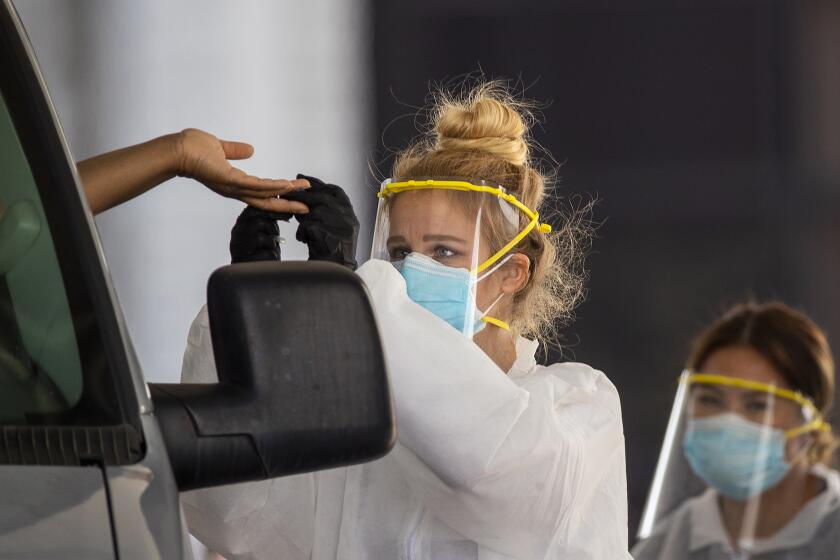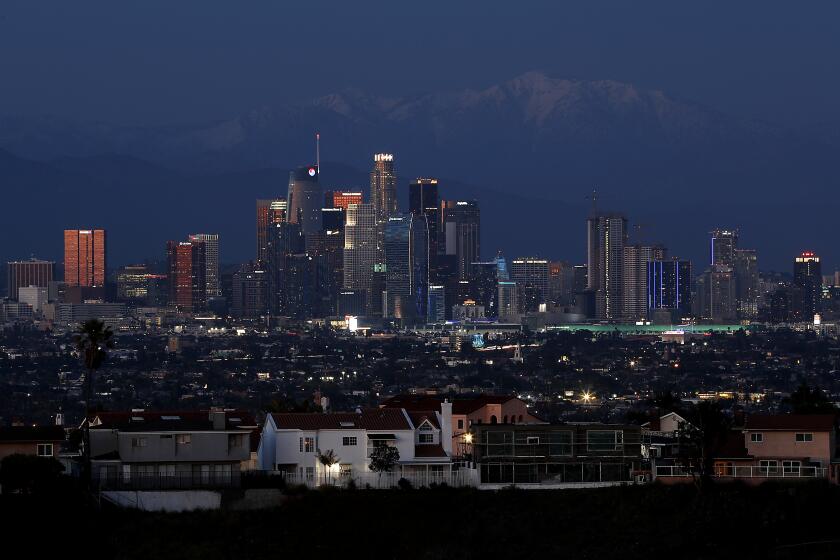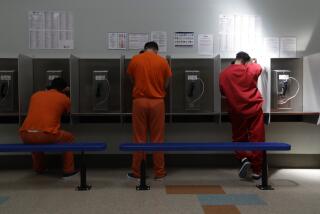COVID-19 concerns prompt hunger strikes and protests inside Otay Mesa Detention Center
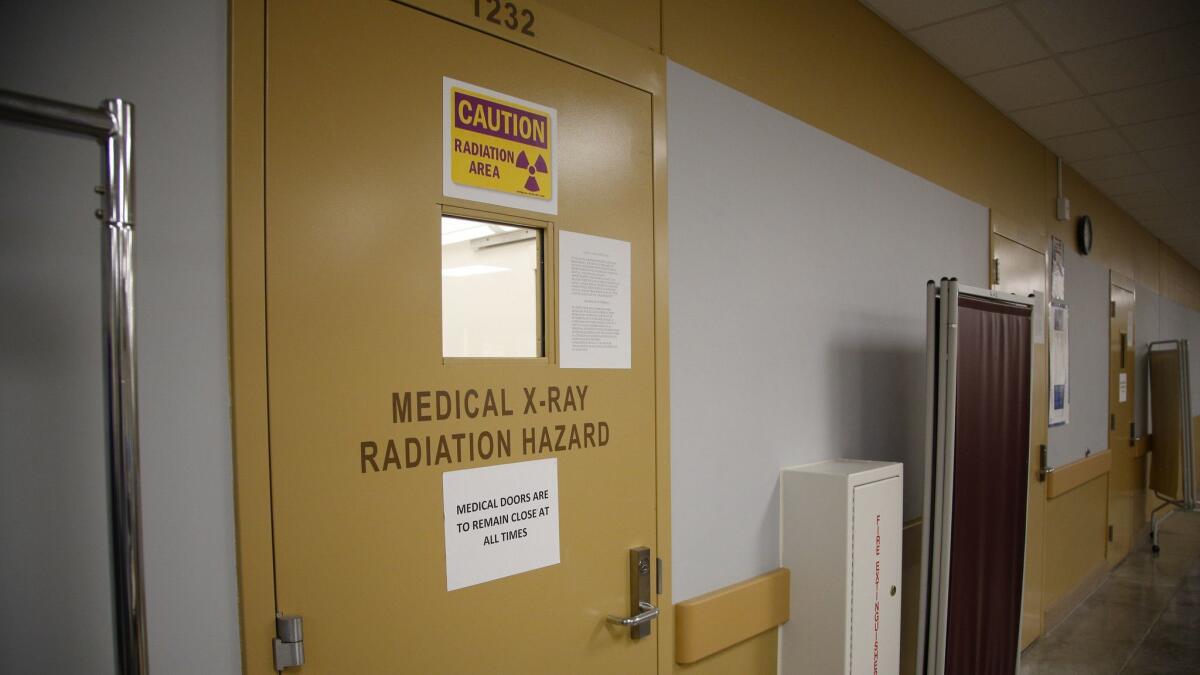
- Share via
SAN DIEGO — Detainees in at least 11 units at the Otay Mesa Detention Center have said they are beginning hunger strikes this week over continued concerns about their safety during the COVID-19 pandemic, according to advocates who communicate with them daily.
Otay Mesa, run by private prison company CoreCivic, holds people in immigration custody as well as those who are awaiting trial or sentencing in federal criminal court. It has been a hot spot for the novel coronavirus among U.S. Immigration and Customs Enforcement detention centers.
As of Thursday afternoon, 18 ICE detainees and nine U.S. Marshals Service inmates at the facility had tested positive, according to facility documents obtained by the San Diego Union-Tribune. The virus had spread to at least nine units, comprising nearly half of the facility.
Ten CoreCivic employees and eight medical staffers have also tested positive for the virus, according to the documents. According to ICE’s website, five of the agency’s employees have tested positive as well. It is not clear whether any of the eight medical staffers overlap with the five ICE workers — some of the facility’s medical personnel are ICE employees, and others are contracted through another company.
“We want our voices to be heard,” Edgar Granski, a detainee in one of the ICE pods, said in a group statement about a hunger strike the men said they were starting Friday morning. “We are afraid for our lives and asking for immediate release of all detainees due to the outbreak of COVID-19 inside Otay Mesa Detention Center.”
ICE said Friday afternoon that no hunger strikes were happening at the facility. ICE generally waits until someone hasn’t eaten for 72 hours before designating a hunger strike.
“ICE fully respects the rights of all people to voice their opinion without interference,” the agency said. “ICE does not retaliate in any way against hunger strikers. ICE explains the negative health effects of not eating to our detainees.”
In one of the U.S. Marshals Service units, prisoners became worried this week when a man who had tested positive was returned to the unit.
Yarim Aguilera, whose boyfriend is among those held in the unit while he awaits sentencing in an illegal reentry case, said the man hadn’t wanted to come back to the pod because he was worrying about infecting others.
“I’m really anxious right now,” Aguilera said. “I don’t know what to do out here.”
Another family member of a Marshals Service inmate, who did not wish to be identified because of the inmate’s ongoing court case, said Friday afternoon that the inmate has been on a hunger strike for a couple of days.
“They’re asking to get medical attention,” the family member said in Spanish. “They’re afraid that they’re already contagious.”
A new study by Stanford University, using antibody blood tests, estimates that the number of cases in Santa Clara County may be 50 to 85 times greater than what was previously known.
The U.S. Marshals Service declined to comment on specific cases, citing privacy concerns. It did not respond to a request for comment on the hunger strikes.
One facility document obtained by the Union-Tribune said that as of Thursday afternoon, 10 detainees were determined to have “recovered” from the infection and had been returned to their units.
For people in detention who have tested positive, the federal Centers for Disease Control and Prevention guidelines recommend that they be kept isolated until they have not had a fever without medication for three days and have tested negative for the virus on two tests at least 24 hours apart.
ICE is responsible for the medical unit at the Otay Mesa Detention Center for both groups of detainees.
“There is a specific time period before a detainee who has tested positive for COVID-19 may be returned to general population,” the agency said. “During this time, the detainee is closely monitored by [ICE Health Services Corps] healthcare providers who determine when the detainee can safely be returned to the general population.”
In another unit that holds U.S. Marshals Service prisoners, women spent most of Wednesday on a strike;they sat on the floor in protest and demanded more medical attention, one of the women said. The woman did not want to be identified because of her ongoing court case.
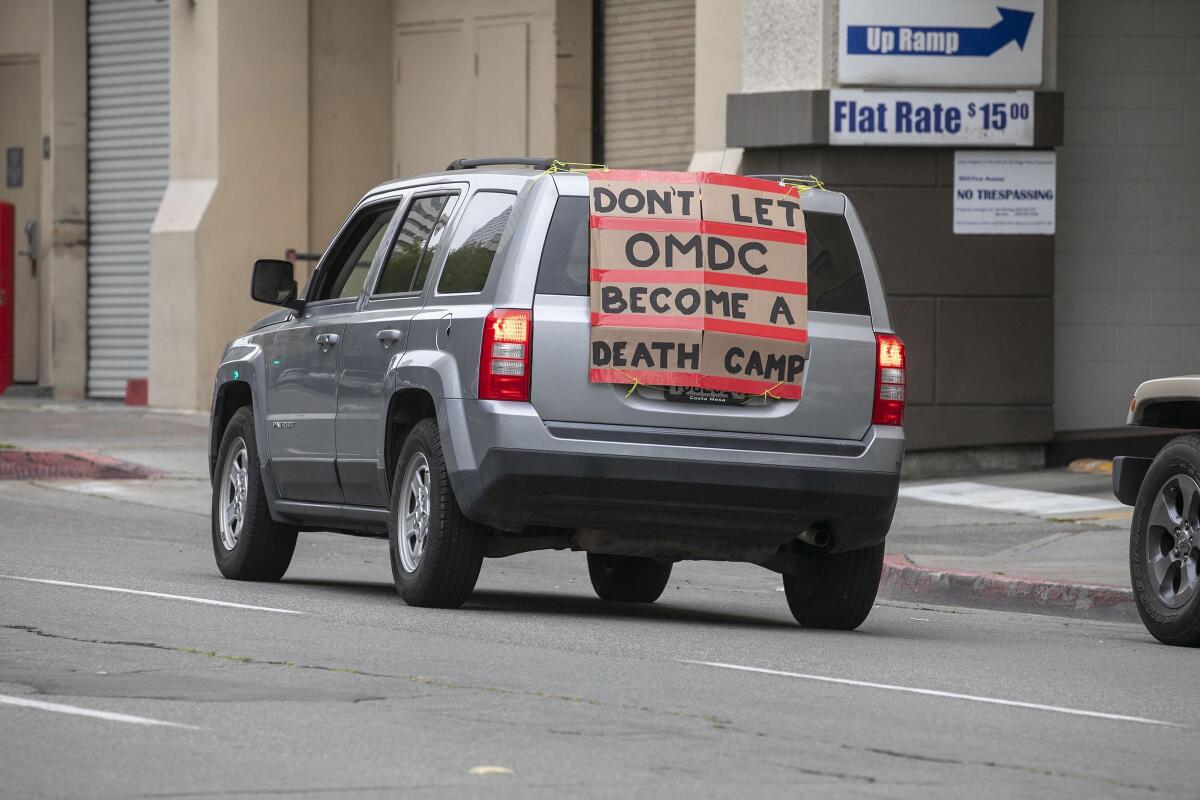
“It’s inhumane,” the woman said in Spanish. “We have the right to health. We’re not safe here.”
The women were given surgical masks a week ago, but they will have a new one issued only every 15 days, the woman said. She doesn’t believe her mask is protecting her anymore because she’s already worn it for a week, but she keeps wearing it anyway.
All of the women in her unit are asking to be tested after cases were reported there.
She said another inmate in the unit had not been able to get tested while inside but tested positive after being released on bond.
That was the second person with whom she had direct contact who tested positive, the woman said.
So far, her concerns seem to have been ignored, she said.
“Maybe the institution is doing what it can, but if they can’t do it well, or if they don’t have tests, they should say so,” she said.
Her father is worried that by the time she has enough symptoms to be tested, it will be too late, he said in a phone interview.
The CDC recommends individually quarantining detainees who have probably been exposed to the virus.
A few detainees have tried asking federal judges to order their release from the facility. Though judges in other parts of the country, including Los Angeles, have granted such petitions, judges in the Southern District of California so far have not.
In one of the recently denied cases, Judge Cynthia A. Bashant said that because the petitioner was not especially vulnerable to the virus, she would not order his release.
The Otay Mesa Detention Center “also appears to be taking great pains to protect the public during this unprecedented public health crisis,” she said in her order.
Erika Pinheiro, an attorney with the legal nonprofit Al Otro Lado who has clients at Otay Mesa, said she was frustrated to see these denials while the number of cases at the facility rises.
Only 45% of Los Angeles County residents are still employed, a national survey released Friday shows. Meanwhile, uncertainty and anxiety grow.
“People who are young and healthy also have serious complications, including death,” Pinheiro said. “The thing that really worries me is I’ve had clients close to death at Otay because of the lack of medical care there. I think that we will probably see more fatalities among otherwise healthy people because of lack of access to care at Otay.”
Grecia Perez, 28, is worried because her husband is in ICE custody at the facility. An asylum seeker from Ukraine, her husband missed a court date and was ordered deported in his absence.
They were working to try to adjust his status after they got married, and he was picked up by ICE in late February after a DUI charge.
“Now I’m freaking out because the virus is getting worse and worse inside of there,” Perez said.
Her husband was supposed to be released this week to wait for his court hearing at home, but officials have been slow with paperwork, she said, and now he has told her that he probably won’t be out until next week.
More to Read
Sign up for Essential California
The most important California stories and recommendations in your inbox every morning.
You may occasionally receive promotional content from the Los Angeles Times.
